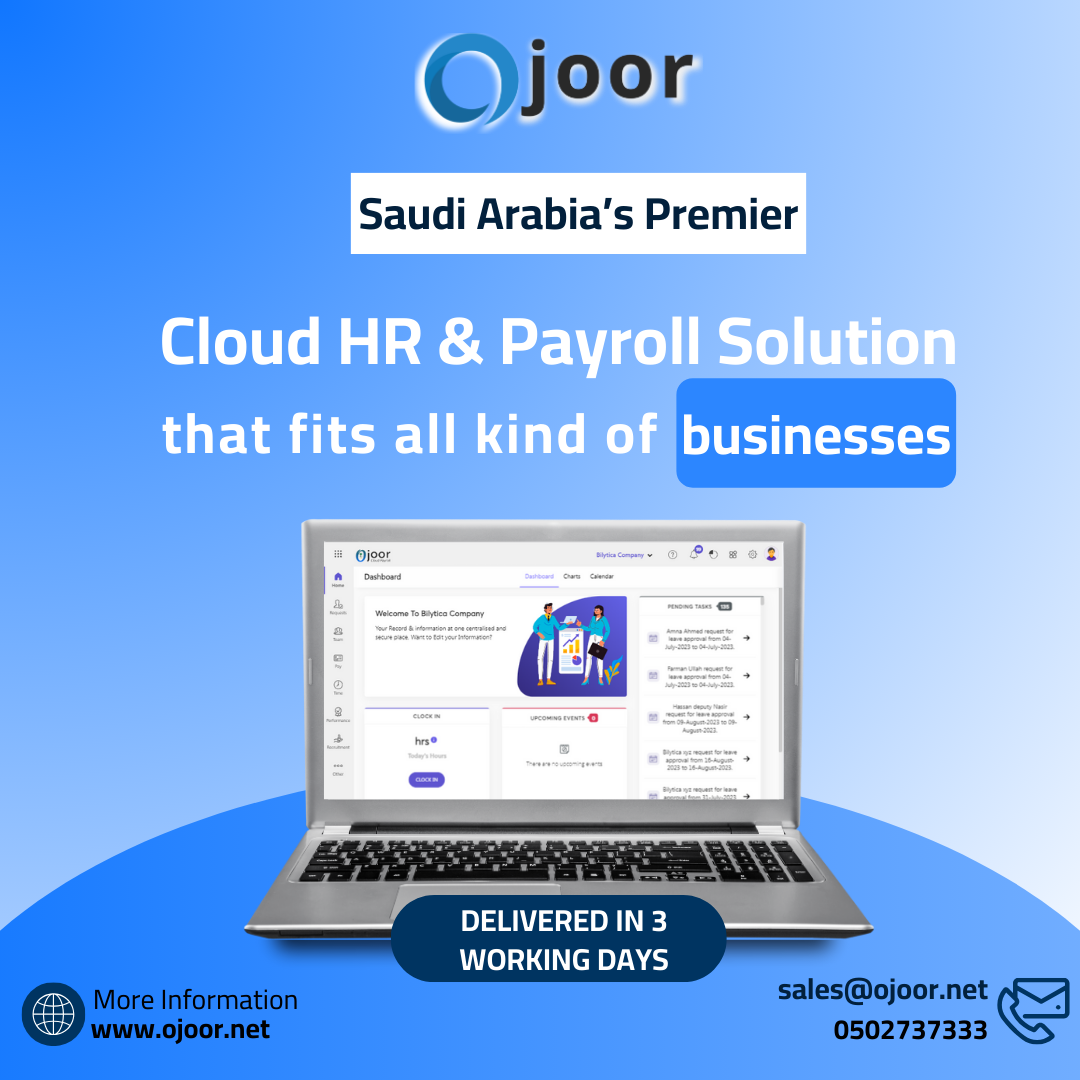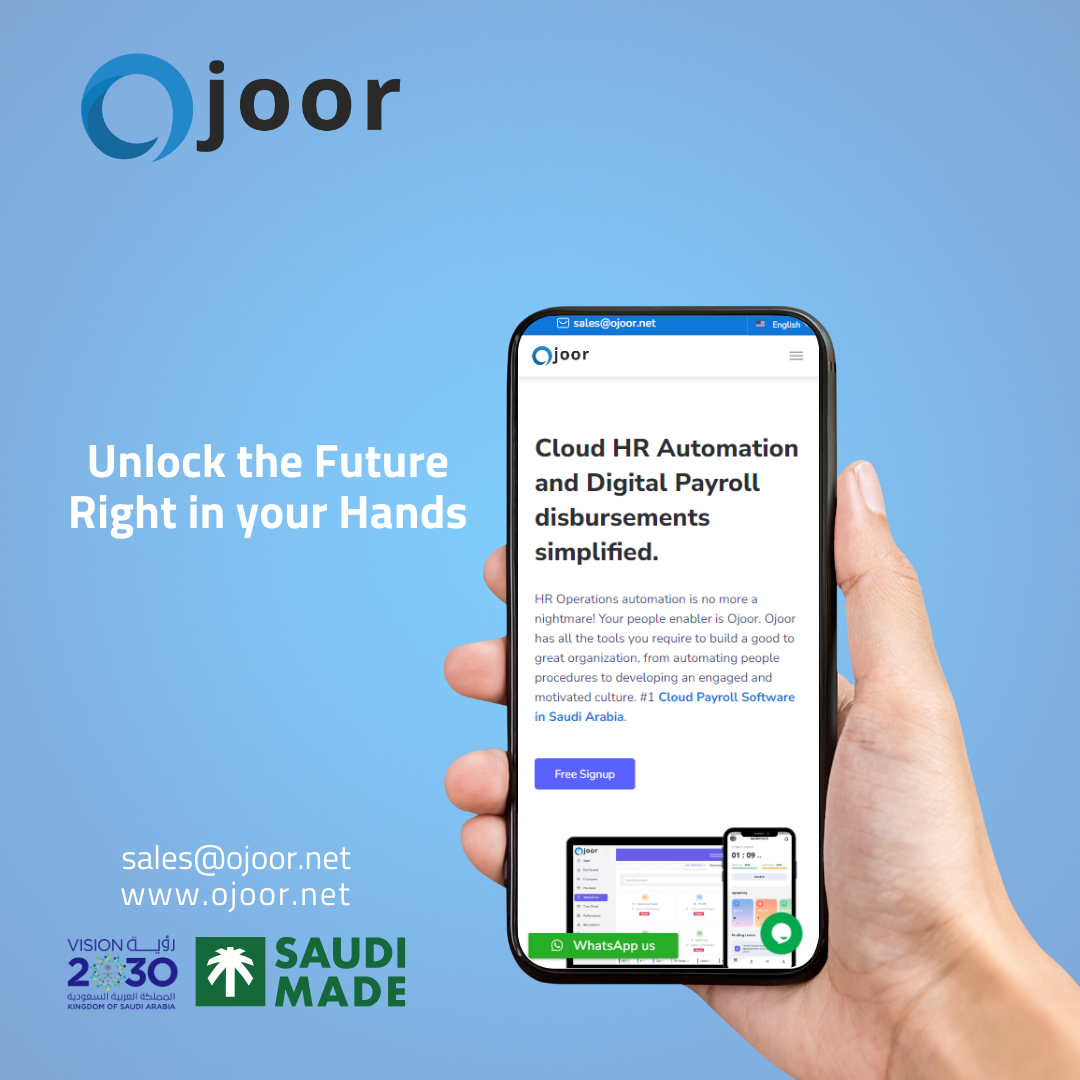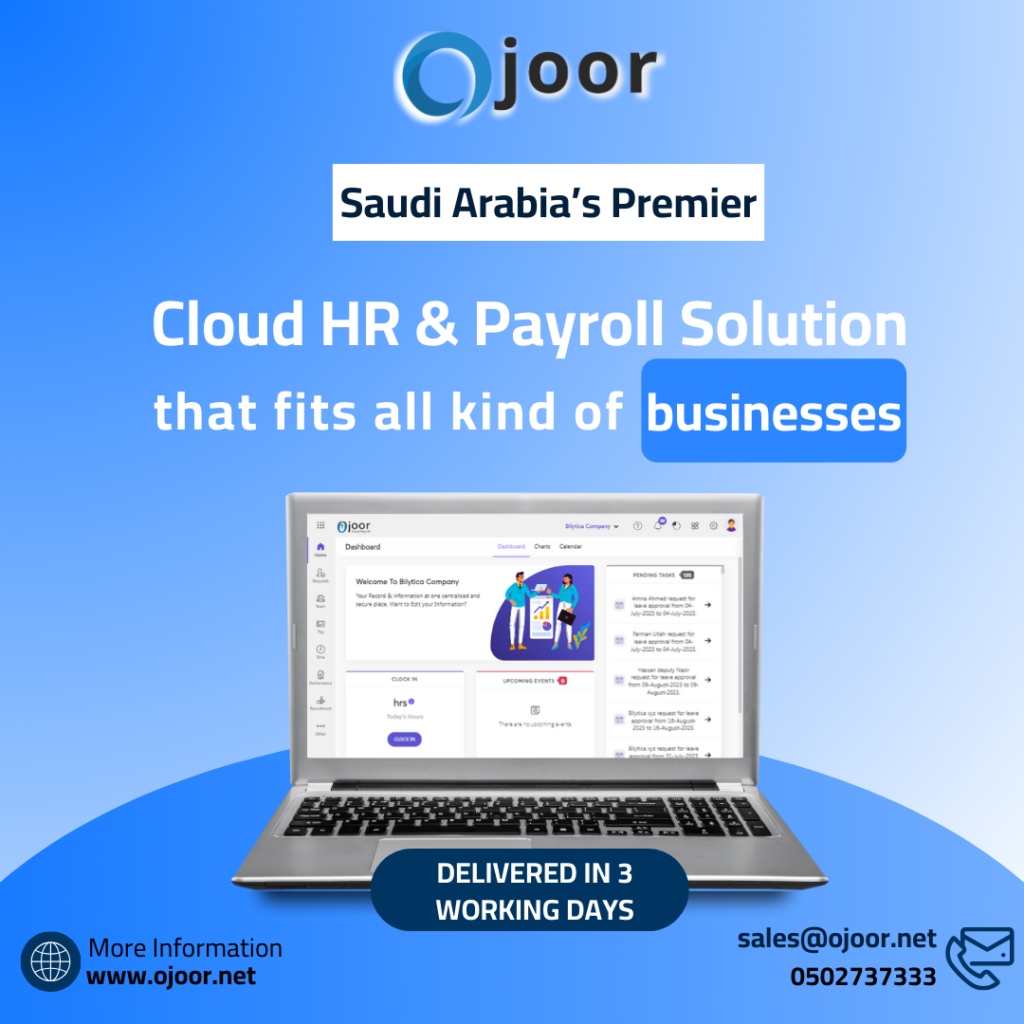Ojoor # 1 is one of the top Employee Management System in Saudi Arabia and is integral to the efficient functioning of businesses, providing a centralized platform for managing various aspects of human resources. In Saudi Arabia, EMS platforms must cater to unique regulatory, cultural, and operational requirements to ensure compliance and effectiveness. This article explores the key features of EMS tailored for Saudi businesses, highlighting their importance in streamlining HR processes and enhancing organizational productivity.
Click to Start Whatsapp Chatbot with Sales
Mobile: +966547315697
Email: sales@Ojoor.net
Ojoor #1 Employee Management System in Saudi Arabia

Compliance with Saudi Labor Laws
Wage Protection System (WPS) Integration
One of the primary features of an Employee Management System in Saudi Arabia is its integration with the Wage Protection System (WPS). This government-mandated system ensures that employees receive their salaries on time and according to the agreed terms.
- Automated Payroll Processing: EMS platforms automate payroll calculations and ensure timely salary disbursements compliant with WPS.
- Data Submission: EMS platforms facilitate the submission of payroll data to the Ministry of Human Resources and Social Development (HRSD), ensuring compliance with regulatory requirements.
Saudization Compliance
Saudization, or Nitaqat, is a policy aimed at increasing the employment of Saudi nationals in the private sector. EMS platforms help businesses comply with Saudization requirements by monitoring the composition of their workforce.
- Workforce Monitoring: EMS platforms track the percentage of Saudi nationals in the workforce, ensuring compliance with Saudization targets.
- Reporting: Automated reporting tools generate Saudization compliance reports for submission to regulatory authorities.
General Organization for Social Insurance (GOSI) Integration
Compliance with GOSI regulations is mandatory for all businesses operating in Saudi Arabia. EMS platforms facilitate the management of social insurance contributions.
- Contribution Calculations: EMS platforms automatically calculate GOSI contributions for both employers and employees.
- Submission of Reports: The platforms generate and submit necessary GOSI reports, ensuring compliance with social insurance regulations.
Employee Self-Service (ESS) Capabilities
Personal Information Management
Employee Management System in Saudi Arabia platforms empower employees by providing them access to manage their personal information. This feature reduces the administrative burden on HR departments.
- Profile Updates: Employees can update their contact details, emergency contacts, and bank account information.
- Document Management: Employees can upload and manage personal documents such as identification cards and certificates.

Leave and Attendance Management
Efficient management of leave and attendance is crucial for maintaining productivity and employee satisfaction.
- Leave Requests: Employees can apply for leave, view their leave balances, and track the status of their requests.
- Attendance Tracking: HR System in Saudi Arabia platforms integrate with attendance systems to provide real-time tracking of employee attendance, including check-in/check-out times and overtime hours.
Payroll and Compensation Access
Transparency in payroll and compensation details fosters trust and satisfaction among employees.
- Pay Slip Access: Employees can view and download their pay slips and understand the breakdown of their salary.
- Compensation Details: Employees have access to information regarding their bonuses, allowances, and deductions.
Recruitment and Onboarding
Job Posting and Applicant Tracking
EMS platforms streamline the recruitment process by automating job postings and tracking applicants.
- Multi-Channel Job Posting: Job openings can be posted across multiple channels, including job boards, company websites, and social media.
- Applicant Tracking System (ATS): The ATS tracks the progress of candidates through different stages of the recruitment process, from application to hiring.
Onboarding Process Automation
A structured onboarding process is essential for integrating new hires into the organization effectively.
- Digital Onboarding Portals: New employees can complete onboarding paperwork, access company policies, and undergo initial training through digital portals.
- Task Management: EMS platforms assign and track onboarding tasks, ensuring that new hires complete all necessary steps.
Performance Management
Goal Setting and Tracking
EMS platforms facilitate the setting and tracking of employee goals, aligning them with organizational objectives.
- SMART Goals: Employees and managers can set Specific, Measurable, Achievable, Relevant, and Time-bound (SMART) goals.
- Progress Tracking: Regular updates and tracking ensure that employees stay on track to achieve their goals.
Performance Appraisals
Structured performance appraisal processes help evaluate employee performance and provide constructive feedback.
- Appraisal Forms: EMS platforms provide customizable appraisal forms that can be tailored to different roles and departments.
- Feedback Mechanism: Employees can receive and provide feedback, fostering a culture of continuous improvement.
Training and Development
E-Learning Modules
Continuous learning and development are crucial for employee growth and organizational success.
- Online Training: Employees can access e-learning modules and complete training sessions at their convenience.
- Certification Tracking: EMS platforms track the completion of training modules and issue certificates.
Skill Development Programs
EMS platforms support skill development by identifying training needs and providing relevant programs.
- Skill Assessments: Regular assessments help identify skill gaps and training needs.
- Development Plans: EMS platforms create personalized development plans for employees to enhance their skills.
Employee Engagement and Communication
Internal Communication Tools
Effective communication is key to employee engagement and organizational success.
- Messaging Systems: LMS training platforms provide internal messaging systems for seamless communication between employees and management.
- Announcements: Important announcements and updates can be shared with employees through the platform.
Employee Surveys and Feedback
Regular surveys and feedback mechanisms help in understanding employee sentiment and improving workplace culture.
- Pulse Surveys: Short, regular surveys gauge employee sentiment on various aspects of the workplace.
- Feedback Forms: Employees can provide feedback on different aspects of their job and work environment.
Reporting and Analytics
HR Metrics and Analytics
Data-driven decision-making is facilitated by comprehensive reporting and analytics tools.
- Dashboards: EMS platforms provide dashboards that display key HR metrics, such as employee turnover, absenteeism, and productivity.
- Custom Reports: Customizable reports help HR managers analyze various aspects of workforce management and make informed decisions.
Compliance Reporting
Ensuring compliance with local labor laws and regulations is critical for businesses operating in Saudi Arabia.
- Automated Reports: EMS platforms generate compliance reports for submission to regulatory authorities, ensuring adherence to legal requirements.
- Audit Trails: Detailed audit trails track all changes and transactions, providing transparency and accountability.
Mobile Accessibility
Mobile Applications
With the increasing use of smartphones, mobile accessibility is a crucial feature of modern EMS platforms.
- Employee Self-Service: Mobile apps allow employees to access ESS features, such as leave requests and pay slips, on-the-go.
- Manager Approvals: Managers can approve leave requests, expenses, and other tasks through mobile apps, ensuring timely responses.
Data Security and Privacy
Advanced Security Measures
Protecting sensitive employee data is paramount for any EMS platform.
- Data Encryption: EMS platforms employ data encryption to secure sensitive information.
- Access Controls: Role-based access controls ensure that only authorized personnel have access to specific data.
Compliance with Data Protection Regulations
Adhering to data protection regulations, such as the Personal Data Protection Law (PDPL) in Saudi Arabia, is essential.
- Privacy Policies: EMS platforms implement privacy policies in line with local regulations to protect employee data.
- Regular Audits: Regular security audits ensure that the EMS platform remains compliant with data protection laws.
Conclusion
Employee Management Systems tailored for Saudi businesses are equipped with a range of features designed to address unique regulatory, cultural, and operational challenges. From compliance with Saudi labor laws and Saudization policies to providing robust employee self-service capabilities and ensuring data security, these platforms play a critical role in streamlining HR processes and enhancing organizational productivity. As businesses in Saudi Arabia continue to evolve, the adoption of advanced EMS platforms will be crucial in driving efficiency, compliance, and employee satisfaction.
Click to Start Whatsapp Chatbot with Sales
Mobile: +966547315697
Email: sales@Ojoor.net
Employee Management Software in Saudi Arabia
Employee Management Software in Saudi Arabia
Employee Management Software in Saudi Arabia
Key features of Employee Management System in Saudi Arabia similar software solutions prices were updated on 2024-10-24T04:15:31+00:00 in Saudi Arabia in Mecca, Medina, Riyadh, Khamis Mushait, Yanbu, Jeddah, Dammam, Unaizah, Uqair, Ha’il, Ta if, Al Bahah, Dhahran, King Abdullah Economic City, Najran, Diriyah, Qatif, Khafji, Jubail, Abqaiq, List of Cities and Towns in Saudi Arabia, Ras Tanura, Turubah, Jazan Economic City, Knowledge Economic City, Medina, Khobar, Abha, Tabuk, Saudi Arabia, similar software solutions prices were updated on 2024-10-24T04:15:31+00:00 We also provide in Saudi Arabia services solutions company in Hafar Al-Batin, Udhailiyah, Al-Awamiyah, Hofuf, Hautat Sudair, Buraidah, Tayma, Duba, ‘uyayna, Saihat, Al-Kharj, Al-ula, Jizan, Rumailah, Ar Rass, Arar, Shaybah, Al Majma’ah, Rabigh, Dhurma, Haradh, List of Saudi Cities by Gdp Per Capita, Badr, Sudair Industrial City, Baljurashi, Shaqraa, Al-Khutt, Habala, Ad Dawadimi, Dawadmi, Layla, similar software solutions prices were updated on 2024-10-24T04:15:31+00:00 Price is SAR 100 and this was updated on updated on 2024-10-24T04:15:31+00:00 similar Key features of Employee Management System in Saudi Arabia software solutions prices were updated on 2024-10-24T04:15:31+00:00 in Saudi Arabia in Haql, Afif, Al-Abwa, Farasan, Al-Jaroudiya, Thadig, Al-Thuqbah, Al Wajh, Almardmah, Al-Zilfi, Muzahmiyya, Prince Abdul Aziz Bin Mousaed Economic City, Tharmada’a, Skaka, Um Al-Sahek, Sharurah, Tanomah, Bisha, Dahaban, Al Qunfudhah, Qurayyat, Saudi Arabia, Ha’ir, as Sulayyil, Al Lith, Turaif, Al-Gway’iyyah, Samtah, Wadi Ad-Dawasir, Az Zaimah, Safwa City, Jalajil, Harmah, Mastoorah, Hotat Bani Tamim, Jabal Umm Al Ru’us, Rafha, Qaisumah, Al-Ghat, Hajrah, Al-Hareeq. Excerpt: Jeddah (also spelled Jiddah, Jidda, or Jedda; Arabic: Jidda) is a Saudi Arabian city located on the coast of the Red Sea and is the major urban center of western Saudi Arabia similar software solutions prices were updated on 2024-10-24T04:15:31+00:00 Price is SAR 100 and this was updated on updated on 2024-10-24T04:15:31+00:00
6-24-2024

